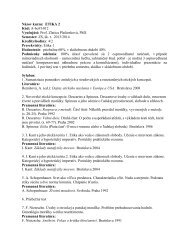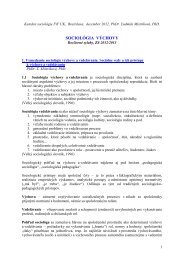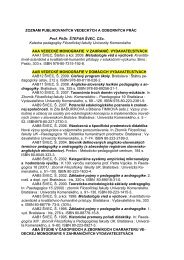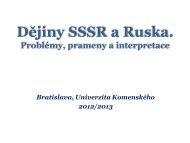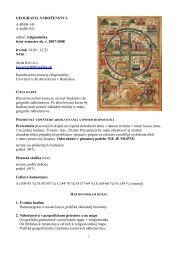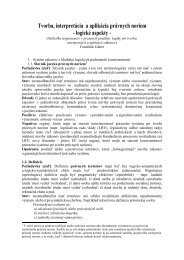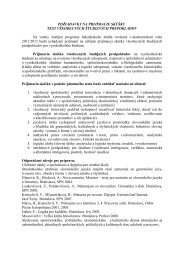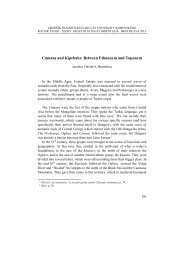Virtues of Authenticity ESSAYS ON PLATO AND SOCRATES ...
Virtues of Authenticity ESSAYS ON PLATO AND SOCRATES ...
Virtues of Authenticity ESSAYS ON PLATO AND SOCRATES ...
Create successful ePaper yourself
Turn your PDF publications into a flip-book with our unique Google optimized e-Paper software.
<strong>Virtues</strong> <strong>of</strong> <strong>Authenticity</strong><br />
<strong>ESSAYS</strong> <strong>ON</strong> <strong>PLATO</strong> <strong>AND</strong><br />
<strong>SOCRATES</strong><br />
Alexander<br />
Nehamas<br />
PRINCET<strong>ON</strong> UNIVERSITY PRESS<br />
PRINCET<strong>ON</strong>, NEW JERSEY
C<strong>ON</strong>TENTS<br />
Acknowledgments<br />
List <strong>of</strong> Abbreviations<br />
Introduction<br />
tX<br />
xiii<br />
xv<br />
I. Socrates: Questions <strong>of</strong> Goodness and Method<br />
<strong>ON</strong>E<br />
Meno's<br />
Paradox and Socrates as a Teacher<br />
Two<br />
Socratic Intellectualism<br />
THREE<br />
What Did Socrates Teach and to Whom Did He Teach It?<br />
FOUR<br />
Voices <strong>of</strong> Silence: On Gregory Vlastos's Socrates<br />
FIVE<br />
Eristic, Antilogic, Sophistic, Dialectic: Plato's Demarcation <strong>of</strong><br />
Philosophy from Sophistry<br />
3<br />
27<br />
59<br />
83<br />
108<br />
II. Plato: Questions <strong>of</strong> Metaphysics and Epistemology<br />
SIX<br />
On Parmenides'<br />
Three Ways <strong>of</strong> Inquiry<br />
SEVEN<br />
Plato on the Imperfection <strong>of</strong> the Sensible World (,41Y~ '1 r&~ UPjPl?lrt(j)<br />
EIGHT<br />
Confusing Universals and Particulars in Plato's Early Dialogues<br />
NINE<br />
Self-Predication and Plato's Theory <strong>of</strong> Forms<br />
TEN<br />
Participation and Predication in Plato's Later Thought<br />
ELEVEN<br />
Episteme and Logos in Plato's Later Thought<br />
125<br />
138<br />
159<br />
176<br />
196<br />
224
Vlll<br />
TWELVE<br />
Plato on Imitation<br />
C<strong>ON</strong>TENTS<br />
III. Plato: Questions <strong>of</strong> Beauty and the Arts<br />
ThIRTEEN<br />
Plato and the Mass Media<br />
FOURTEEN<br />
The Symposium<br />
FIFTEEN<br />
The Republic<br />
SIXTEEN<br />
The Phaedrus<br />
Index <strong>of</strong> Passages Cited<br />
General Index<br />
and Poetry in Republic X<br />
IV: Plato: Individual<br />
Works<br />
251<br />
279<br />
303<br />
316<br />
329<br />
359<br />
365<br />
ACKNOWLEDGMENTS<br />
ThE <strong>ESSAYS</strong>collected here were written over roughly the past twenty-five<br />
years. They cover a number <strong>of</strong>issues raised by Plato's writing, and I would<br />
never have been able to compose them if it had not been for the help,<br />
criticism, and encouragement I received from all those named in various<br />
notes throughout this volume, and others besides. Some must also be<br />
named here.<br />
Gregory Vlastos, to whom these essays are dedicated, stands behind<br />
many <strong>of</strong> the questions I have asked <strong>of</strong> Plato so far. My ideas on Socrates<br />
and on Plato's metaphysics, epistemology, and philosophy <strong>of</strong> language<br />
were sparked by his own brilliant work. My answers have not always been<br />
the same as his, but the questions, and, by and large, the framework within<br />
which I have tried to answer them, have been established by him and are<br />
common to us both. I would hope that our divergences, particularly in<br />
what he probably would have described as my more "literary" approach to<br />
Plato's treatment <strong>of</strong> Socrates and to the nature <strong>of</strong> the dialogues as a whole,<br />
are only instances <strong>of</strong> what Nietzsche had in mind when he wrote that one<br />
repays a teacher badly if one always remains only a pupil. I owe him an<br />
immense debt <strong>of</strong> gratitude.<br />
Since 1971, I have had the good fortune to have always been a friend<br />
and, for most <strong>of</strong> that time as well, a colleague <strong>of</strong> John Cooper. We have<br />
discussed Greek philosophy on innumerable occasions, in public and in<br />
private. We have <strong>of</strong>ten disagreed, but I have learned more from his remarkable<br />
dialectical ability and his even more remarkable persistence in<br />
the pursuit <strong>of</strong> philosophical understanding than from anyone else. He has<br />
established for me the standards for the clear, textured, productive, and<br />
philosophical interpretation <strong>of</strong> all the texts and issues that concern us in<br />
common and many that do not. His own collected essays, which are to<br />
appear at about the same time as this volume, represent philosophical<br />
thinking <strong>of</strong> a level to which it is as easy to aspire as it is difficult to attain.<br />
Paul Guyer, whose own interests lie far from the Greek authors, but who<br />
has a sense <strong>of</strong> the philosophical importance <strong>of</strong> the history <strong>of</strong> philosophy,<br />
has also been a friend and, on two distinct occasions, a colleague during<br />
this period. He has been the most generous and sympathetic <strong>of</strong> listeners,<br />
always able and willing to make the effort to translate the <strong>of</strong>ten abstruse<br />
discussions <strong>of</strong> classical scholars and to translate them into clear and philosophically<br />
significant terms. He has given me a rare gift-a sense that<br />
philosophy is unified, that we need not remain isolated each within our<br />
own little area, and that the effort to cross the limits <strong>of</strong> the many narrow




